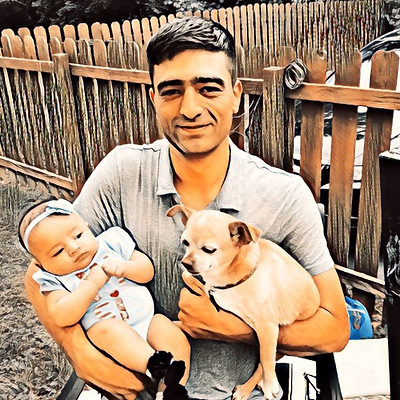314-376-7074

About Us
No Easy Journey - Story by Bill McClellan St. Louis Post-Dispatch
Published Mar 19, 2017
The qaraqul — a triangular, peaked hat made from leather and wool — is traditional headgear for men throughout Central and South Asia. It has its origins in Afghanistan.
Haseeb Ahmadi’s father made such hats in his shop in Kabul, but by the time Haseeb was born in 1991, life in Afghanistan had become chaotic, even for the family of a hat maker. The Russians had left Afghanistan in 1989, but the civil war continued. In 1996, the Taliban took Kabul and introduced a hard-line version of Islam.
It is strange what a child remembers. Haseeb recalls an uncle driving, approaching a checkpoint, and putting his head out the window to give himself a disheveled look. Shaving was forbidden, but it was not enough to have a beard. The beard could not look trimmed. Dishevelment was a virtue.
Haseeb’s family was Tajik. The Taliban were primarily Pashtun. Haseeb’s father decided the prudent course was to leave the country. He took his family — Haseeb was the 11th of 13 children — to Pakistan.
They returned to Kabul when the Americans invaded in 2001.
Haseeb worked as a bicycle mechanic, and he sold cups of water in the market. He went to school and studied computers and English. He had a gift for languages. He already spoke Dari, Pashto and Urdu. By his early teens, he spoke English well enough to get a job with the Americans.
Before long, he was working for the American military as a translator.
In 2013, Marine Corps Gunnery Sgt. Hugh Tychsen arrived in Afghanistan to serve as an embedded advisor to a unit of the Afghan Army that was based in Helmand Province.
Tychsen was a veteran of three tours in Iraq, but this was his first tour in Afghanistan. Imagine being dropped into an alien culture unable to directly communicate with the people whom you are supposed to be advising — and doing this while those people are engaged in heavy fighting. The unit lost 110 men and had more than 500 wounded during the first six months.
Haseeb was the liason between the Afghan Army and its Marine advisers. He and Tychsen became close friends quickly.
“He was my eyes and ears,” Tychsen said.
The dangers were not limited to the Taliban. Afghan Army attacks on U.S. troops — so-called Green on Blue attacks — were also a threat. Sometimes these attacks were ideologically based, and sometimes they had to do with cultural misunderstandings or personal enmity.
Again, Tychsen relied on Haseeb to read people and situations.
In May 2014, as Tychsen prepared to leave Afghanistan, Haseeb wondered aloud about the Tychsen’s replacement. There won’t be one, said Tychsen. The two friends had already talked about the possibility of Haseeb’s coming to the United States. Life was becoming increasingly dangerous for Afghans who worked with the Americans. Tychsen promised to help his friend.
Before leaving, Tychsen sponsored Haseeb for a special immigrant visa.
Even in the midst of uncertainty, life goes on. Haseeb’s cousins told him they had found a young woman for him. He scoffed. Just meet her, they said. He agreed. Your cousins are teasing me, she told him. I am sorry, Haseeb said, but he was smitten.
He married Mahbooba in November 2014.
The U.S. Embassy contacted him about the request for a special visa. Haseeb brought documents to the embassy. He waited 11 months for a response. He was asked to fill out more forms. He did. More waiting. He was jobless. Concerned about safety. Stories circulated about people being kidnapped and tortured.
As they waited, Haseeb and Mahbooba wondered where in America they should try to settle. They had heard of California.
No, no, said Tychsen, who was in email contact with his friend. You should come to St. Louis. It’s a nice place and it’s a whole lot cheaper than California, he said.
Tychsen had already laid the groundwork with the International Institute in St. Louis, and he helped the family move into an apartment in south St. Louis. Haseeb is slight and soft-spoken. He seemed remarkably calm for somebody who had just said goodbye to his family, possibly forever, and had launched this new great adventure. So many unknowable things in front of him.
Maybe he felt a little like Tychsen felt when he arrived in Afghanistan.
